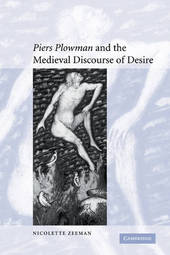
|
'Piers Plowman' and the Medieval Discourse of Desire
Paperback / softback
Main Details
Description
This ambitious work links William Langland's great poem Piers Plowman to wider medieval enquiries into the nature of intellectual and spiritual desire. Nicolette Zeeman traces the history of psychology and its iconography in medieval devotional and theological literature, stretching back to St Augustine and Gregory the Great, and shows how an understanding of these traditions opens up a fresh reading of Piers Plowman. She challenges the consensus according to which the poem narrates an essentially positive 'education' of the will, and reveals instead a narrative of desire emerging from rebuke, loss and denial. This radical reading revolutionises our thinking about Piers Plowman, and sheds light on the history of medieval psychology, devotion, pastoral care, medieval textual theory and literary history.
Author Biography
Nicolette Zeeman is College Lecturer in English at King's College, Cambridge.
ReviewsReview of the hardback: 'Zeeman keeps her promise as her reading unsettles the very notion of development (itself reflected in the linear division of the poem into sequentially numbered passus) ... There can be no doubt that this book represents a serious bid for a lasting place among authoritative readings of the poem ... Zeeman's book is also stimulating in a very personal and, perhaps, catholic sense, since it inadvertently exposes our search for completion, closure, and, ultimately, a happy ending' Anglia
|